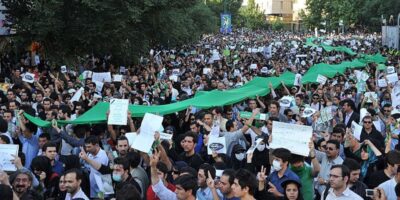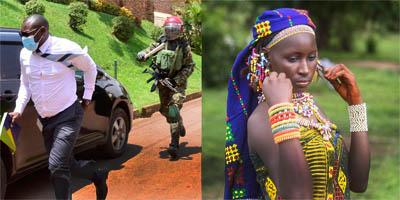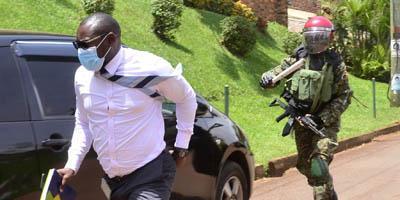Canada stopped its diplomatic relations with Iran in 2012 because of the regime’s continuous human rights abuse, non-compliance with UN Security Council resolutions regarding its nuclear program and its regional policies. Canada also listed Iran as a state supporter of terrorism under the State Immunity Act, and the Quds Force unit of the Islamic Revolutionary Guards Corps as a terrorist entity under the Criminal Code.
The destruction of a Ukrainian airplane by the Revolutionary Guard on January 8, 2020, forced Canada into action as 57 of the 176 people on the flight were Iranian-Canadian.
I spoke about the Iranian regime, its human rights record and the need for change, with Kaveh Shahrooz, a lawyer, human rights activist and senior fellow at the Macdonald-Laurier Institute’s Centre for Advancing Canada’s Interests Abroad.
You have mentioned that Canada should apply its policies toward Iran with a clear focus on human rights issues, how do you evaluate its policies so far?
I would give the Trudeau government a failing grade with respect to its Iran policy. It came to power in 2015 saying they were going to re-engage with Iran. Very shortly thereafter Iran continued to arrest Canadians and one Canadian, Kavous Seyed Emami, ended up being killed under mysterious circumstances. His wife was not allowed to leave Iran, the tensions continued and Iran just continued to behave badly toward Canada and the International community.
The Trudeau government actually changed positions and accepted a Conservative motion in Parliament that said we’re not going to re-engage with Iran and we’re going to list the Revolutionary Guards, the IRGC, as a terrorist organization. They still have not listed the IRGC as a terrorist organization, but given what’s happened around this Ukrainian plane, I think re-engagement’s going to be much tougher.
At the same time, even though we’re not re-engaging, we’re not really doing very much in terms of standing with Iranian people either. In 2017 and in 2019 there were mass protests in Iran. People took to the streets, chanting “death to the dictator”, wanting international support, and in both 2017 and 2019 our prime minister was completely silent. Our foreign ministry put out some very vague and tepid statements saying people should have the right to protest but not really standing in solidarity with Iranian people. We’ve got Magnitsky-type legislation that allows us to sanction human rights violators but the government has been reluctant to use it with respect to Iran.
I worked very hard in 2013 to lobby Canada’s government, Canada’s Parliament to recognize the 1988 massacre of prisoners in Iran as a crime against humanity. Canada is the first country in the world to do so. I was in Parliament that day and I watched the prime minister vote and recognize those killings as crimes against humanity. The people that have been arrested in recent months are in prison and there’s a very real risk that Iran will carry out similar killings on a mass scale against people that took to the streets. The Idea of re-engagement with the very people who are responsible for what the prime minister himself recognized as a crime against humanity is disturbing.
Some people in the Iranian community wonder if Canada would have been active on the airline crash if the 57 passengers were not Iranian-Canadian, what do you think about this?
Had those civilians just had one passport, an Iranian passport, the international community, certainly Canada I feel would have been silent about it and the Iranian government would have just claimed that it was a technical failure and then the world would not know the kind of criminal competence of the people that run Iran. Now immediately after word got out that this was not accidental, that Iranians were actually responsible for this, I think the prime minister did a very good job of speaking forcefully and demanding truth.
I was a little bit disappointed when the prime minister seemed to have changed his tune a little bit and said these civilians were casualty of general tension in the region. That’s actually inaccurate. These people who were killed are the casualty of an Iranian regime that knew when it was going to attack American soldiers and it still allowed airlines to go up in the air, and it was so incompetent that it shot one of its own flights. I think what he was trying to do was maybe shift responsibility off the shoulders of the Iranian regime a little bit, which bothers me.
How do you think Canadians should push their government toward acting better with regard to human rights issues in Iran, while some complain about conflicting messages in the media?
I can certainly sympathize if you are Canadian, not of Iranian background, and you see all these messages coming at you from different media, it is hard to know who’s telling the truth. The truth is actually not that hard to figure out, if you have the right principles. If you’ve got a regime where the people are taking to the streets repeatedly and the regime shuts off the internet and, in the span of three days, kills 1500 people, you know whose side you have to be on.
It’s very clear that it’s the protesters’ side that you have to be on. All you have to do is just listen to what they’re chanting. They are chanting, “Death to the Islamic Republic” or “Reformist, hardliner, the game is over.” I think what we are seeing is a wholesale rejection of the Islamic Republic in all its forms. I think people want a referendum, people want freedom and people want a secular democracy.
One of the things that the Iranian government and a lot of other dictatorships have figured out is to try to use civil society in the West to their own advantage.
So they’ve set up either directly or indirectly, lobby organizations that don’t claim to be lobbies but they claim to be pro-peace. They talk about being pro-human rights but in reality what they are doing is advancing the interests of this dictatorial regime.
It can get kind of confusing for Western society, but again I go back to the starting principle, when you actually just look at Iranians on the street. Are they chanting against America? They’re not. Are they walking over the American flag? They’re not. One of their popular chants is “They tell us America’s the enemy but they’re lying, our enemy is right here”. We’ve got to call on our politicians to stand by those protesters and support them in any way we can.
Can you talk more about the lobby groups?
There are a couple of organizations like NIAC (National Iranian American Council) and the Iranian Canadian Congress. I don’t want to call them lobbyists, lobbyists implies they get paid to do what they do. I don’t know if they get paid but certainly their positions are very favourable to the Iranian regime. If somebody is looking at these organizations and trying to figure out what they’re about there’s a couple of questions to ask. How much of this organization’s time is spent attacking America or attacking the West and how much of it is spent attacking Iranian regime? If you’re spending 95% of your time attacking the West and then occasionally giving a slight criticism to the Iranian regime, I think it’s pretty clear what your politics are.
I’ll give you an example. I was a guest on a CBC radio show and the other guest was some representative from the Iranian Canadian Congress and the host asked the person: do you think the Iranian regime should stay or go? This person just refused to answer the question. He danced around and then ultimately he said: well it’s not really my place to answer that question. Now, I remind you this person spends a lot of time talking about what people in the US should be voting for, what people in England should be voting for, what should happen in Bolivia, what should happen in Chili and yet somehow when it comes to Iran he says he can’t talk about what Iranians should do with respect to the regime.
It is very easy to just pose this question to them, “Do you think the Iranian regime is legitimate or not?” And with people who are talking about the Iranian regime as if it’s a legitimate government, one that represents its people to some extent, I think you’re dealing with a lobbyist or you’re dealing with an apologist.
It’s perfectly legitimate to say Western policy is mistaken, there are errors we’ve got to fix, but our focus at the end of the day has to be on the fact that the Iranian regime is to blame for the misery of Iranian people.
In November, 2019, we witnessed another massacre by Iranian regime where it killed over 1500 people and shut down the internet for over a week. Why do you think the Western media was silent about it?
I sort of understand where the media is coming from. Television is a visual medium, you need pictures to tell stories, and if you don’t have those pictures it’s hard to tell those stories. I think the Iranian government has recognized this, and one of the reasons they have shut off the internet is to prevent Western media from getting images that would be powerful and that would allow them to to tell the story. However, there are sources of news out there, Masih Alinejad, a fantastic feminist activist, gets hundreds of videos daily that she can provide to Western outlets. The Western media just doesn’t seem terribly interested in that.
There are a couple reasons for that. One is the Iran lobby which has managed to infiltrate a lot of institutions including the media. You see young television producers that have sympathetic views to the Iranian regime and maybe they’re reluctant to tell these stories. The other thing is, in recent months you would notice that organizations that have sympathies towards the Iranian regime, like NIAC for example, have made it a real project of theirs to go after and attack people like Masih Alinejad and try to discredit them. Precisely because what they want to do is they want to prevent Masih and the news that she gets from making it to Western audiences. It’s our responsibility as activists to stand with people like Masih, to try as much as possible to get the news out.
I will give you another example. The Iranian reporter for Bloomberg News, Golnar Motevalli, was in Iran during the November protest and was reporting on the snowfall. There were fifteen hundred people being killed on the streets and she was reporting about the weather. As soon as Solemani was killed and there were people on the streets, she was talking about the large numbers who were out. This is obviously a failure of Western media to inform audiences, and it’s our responsibility as activists, as people who follow the news to point this out repeatedly, to get the media’s attention.
I spend a lot of time on Twitter and I think that’s really one of the best mediums for us to be on, to amplify these voices and bring our criticism to the editors of these newspapers and say hey, the coverage you are giving is not accurate and you’re focusing on the wrong things. Hopefully over time we can get them to the shift their focus.
If you’re spending time on Twitter and you are seeing a lot of pro-Iranian messages out there, you have to know two things. One, is that the Iranian regime has a cyber organization that’s amplifying its message. Two, it’s very dangerous for ordinary people to come on social media and air their views. This actually brings up another point, which is that I’ve been very disappointed in seeing Twitter allow Iranian regime officials to be there and send their propaganda out to the world without any accountability.
Iran’s communication minister, the person responsible for shutting off the internet to eighty million people, has regular access to Twitter. He is denying these people a chance to give their version of the news, and yet he can give out his propaganda. Technology companies have to exercise some social responsibility, and part of that may involve limiting the ability of the Iranian regime and other dictatorships to put their propaganda out in the world.
How do you explain the large number of people on the streets for the funeral of General Soleimani? This was claimed by many Iranian authorities and lobbyists as representative of support for the Iranian regime in the country.
I’m not going to lie, those were large numbers of people on the streets but every dictatorship in history can, from time to time, get all of its supporters out on the street. Look at Nazi Germany, look at Stalin, look at North Korea, they mobilize and they get their base of support on the street. The Iranian regime has some support, I don’t know what the exact percentage is but let’s say 10% of the population, that still looks like a very large number of people out on the street.
You’ve got to keep several things in mind. One is that in a dictatorial society, it’s very easy for the government to mobilize; it’s very difficult for the opposition to mobilize. If you’re going out on the street to protest, you may pay for it with your life so obviously you’re going to get smaller numbers because far fewer people are willing to take that risk. It’s much easier to go out to the funeral of Soleimani.
The other thing to keep in mind is that there is a nationalist element in Iran. Some people in Iran might oppose the Iranian regime but saw Soleimani as a nationalist hero to some extent. I’m not going to deny the sentiment some people feel. But at the end of the day, I think the frustration was hearing Western media talk about how Iran is uniform in its grief. I don’t think that’s true. Very quickly after news came out of the plane crash, people took to the streets again and they were ripping off pictures of Soleimani. The feeling is not universal.
There are a lot of dissidents in Iran. There are a lot of people who don’t accept the government’s line and I think that’s who we’ve got to be listening to. The Iranian regime for forty years has been putting its messaging out there. It’s the dissidents and the liberals and the women and the marginalized people that we ought to be listening to, those who are protesting and risking their lives in Iran.
Some believe that the heroic picture of General Soleimani in the eyes of some of the population in Iran is the result of Iranian regime’s propaganda over the years. What do you think about it?
The Iranian regime obviously came into power as an Islamic State and it’s often times been very opposed to Iranian nationalism. It’s tried to downplay Iranian nationalism and emphasize Iran’s Islamic heritage but from time to time they realize that nationalism is a very powerful force. So what they tried to do with Soleimani is to portray him as a nationalist hero, someone who is standing up for Iran’s interests against the rest of the world. It is a powerful message and it’s one that resonates.
Look at Soleimani’s record. He is a person responsible, directly or indirectly, for hundreds of thousands of deaths of Syrian children. I am not sure what version of Iranian nationalism thinks it’s good to be raining chemical weapons down on Syrian children. What he’s done in destabilizing Iraq or the rest of the region is despicable. He was a morale monster but the Iranian regime has to some extent been successful, on occasion, in utilizing Iranian nationalism to gain some support.
The Iranian regime may again shut down the internet for the nation. Do you think the human rights supporters should give any priority to this concern?
These days the internet is obviously necessary for mobilization, for organization and for getting news out about what dictatorial regimes are doing. Iran is very keen on shutting off the internet occasionally, and then finally moving Iran off the global internet and on to a national Intranet. Both of these things are very dangerous. I don’t know what the solution is but I know that there are smart people out there working on solutions. It’s really the responsibility of the Canadian government, the US government and others to figure out how we can do this so that the Iranian regime can’t isolate Iran the way North Korea’s government has isolated North Koreans. We need to make sure that there is sustainable accessible internet for Iranians. That ought to be one of our key priorities.
The closing of diplomatic relations in 2012 has put pressure on ordinary Iranian people. How do you think the issue should be handled so that Iranian people don’t pay the cost for lack of relations between Canada and Iran?
When you’re trying to punish a dictatorial regime or sanction it, it is important to think of it as a hostage situation. You got a hostage-taker, which is the regime, and the hostages, which are 80 million people and the diaspora. You want to target the hostage-taker but not harm the hostages. This is hard to do.
Sometimes you impose sanctions and those sanctions harm ordinary people. Sometimes you cut off diplomatic relations and it makes life tougher for ordinary people. But I think it’s important to distinguish two things, consular services and diplomatic relations. Those things tend to happen together in embassies but they don’t need to happen together, so what has really imposed a lot of difficulty on ordinary people is the absence of consular services.
If you want to get your birth certificate, death certificate et cetera, these are consular issues. Canada to my knowledge has proposed that Iran open an interest section in Canada, in another embassy, much like the U.S. Iran does not have an embassy in the US, but the Pakistani embassy serves as the interest section and Iranians can do all their regular clerical things there. As far as I understand it the Iranian government is the one that has actually been reluctant to allow this, and I think in large part because they want to impose this hardship on the citizens and get them to speak out against Canada. I think it’s easy to solve the consular issue, and I really hope that Canada focuses on that.
I think restoring diplomatic relations should be thought of as a reward for good behaviour. The Iranian regime, in the past couple of years, has killed one of our citizens in prison, refused to allow others to leave and then recently shot fifty seven of our citizens out of the sky. That is not good behaviour. They should not be rewarded with diplomatic relations for that. It’s important to think of consular services and diplomatic relations separately and try to figure out how we can solve the Consular issue so that ordinary people don’t suffer.
To summarize, what do you think the world should do to support human rights in Iran?
Governments and civil society have to, first of all, change their general thinking on Iran. I think for two decades the thinking has been, “Well, the Iranian regime is dictatorial, but there’s a reformist wing that’s trying to fix things and that’s who we should be working with.”
What I’d like to see is for our government and for our civil society to stop thinking about Iran that way. There is no reformist wing in Iran. Every wing of the Iranian Regime ultimately owes its loyalty to the theocratic structure. That’s the system they want in place, so what we ought to be thinking about is not this faction against that faction. We got to be thinking about this regime against the people. That should be our conceptual framework.
Once you do that, a lot of policies become clearer. Once you think of it as people against the regime, you ought to be thinking about how we empower people to stand up against the regime. How do we give them the internet and make sure the regime can’t cut off their internet? How do we give them consular services when they need it so that the regime can’t deny them the ability to do certain clerical things? Who is oppressing the people? In large part it’s the Revolutionary Guard, for example. How do we take a hardline on them?
Trudeau’s government agreed a year ago to list the Revolutionary Guard as a terrorist organization. Why have we still not done that? I think it’s because we’re just thinking about the world in the wrong way. If we think about it as an organization, an entity that is attacking people, then I think it is a pretty easy policy decision to say that this is actually a terror group. It is terrorizing ordinary people.
With civil society, it is the same thing. Once you think of it as a regime against the people, then you can try to figure out who you’re working with. Are you working with organizations and people that are focused on ordinary citizens, or are you dealing with people that have ties to the regime? If they are sympathetic to the regime, that’s not who you should be dealing with. That’s not who should be presented to the media as an effective voice or representation of the Iranian people. I think once we get that conceptual framework right, a lot of the other decisions, policy decisions and organizational decisions will follow as a result.









Paul
Very interesting interview. Thanks!
It’s not only Canada whose foreign policy towards Iran is confused and probably counter-productive. The UK doesn’t know what its line is, perhaps because we still have to follow EU positions at least to some extent…